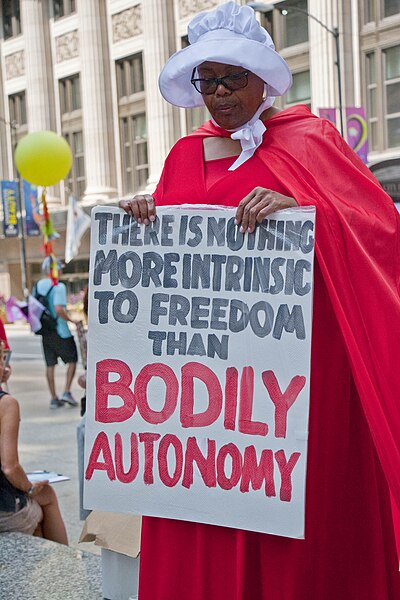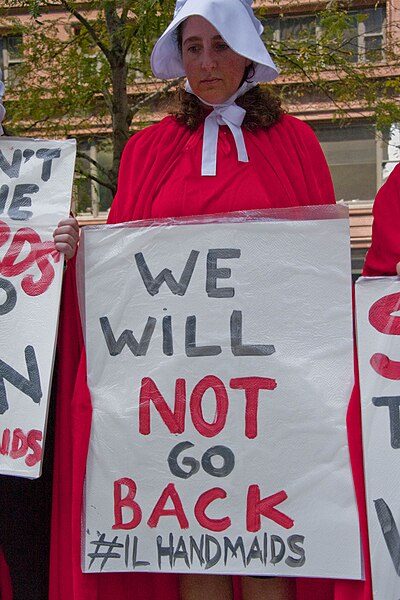
The Handmaid’s Tale is a novel by the Canadian author Margaret Atwood, published in 1985. It is set in New England of the future, in a totalitarian state that takes over the United States government. Handmaid is an old fashioned term for personal servant. Other words sometimes used in old books for handmaids include handmaidens or maidservants. Handmaid specifically means female servant, derived from Old English terms referring to someone who is nearby or close at hand, and the word maid, originally meaning a woman who is not married.
In up-to-date English usage, the term housekeeper is usually applied to the job that was formally called a handmaid, since a housekeeper can be male or female.
The Thammasat University Library owns a number of books by and about Margaret Atwood, including The Handmaid’s Tale.
The Handmaid’s Tale shows a future world where women are oppressed by religion and social customs.
In part due to a widely watched television serial, The Handmaid’s Tale has remained a current subject. Margaret Atwood has referred to it as speculative fiction, discussing social, political, and religious developments in the United States of America in the 1980s.

The novel is written in plain language, as these excerpts makes clear:
- Ignoring isn’t the same as ignorance, you have to work at it.
- As all historians know, the past is a great darkness, and filled with echoes. Voices may reach us from it; but what they say to us is imbued with the obscurity of the matrix out of which they come; and, try as we may, we cannot always decipher them precisely in the clearer light of our own day.
- There is more than one kind of freedom, said Aunt Lydia. Freedom to and freedom from. In the days of anarchy, it was freedom to. Now you are being given freedom from. Don’t underrate it.
- Tell, rather than write, because I have nothing to write with and writing is in any case forbidden. But if it’s a story, even in my head, I must be telling it to someone. You don’t tell a story only to yourself. There’s always someone else. Even when there is no one.
- You must cultivate poverty of spirit. Blessed are the meek. She didn’t go on to say anything about inheriting the earth.
- The sitting room is subdued, symmetrical; it’s one of the shapes money takes when it freezes.
- Blessed are they that mourn, for they shall be comforted. Nobody said when.
- Sanity is a valuable possession; I hoard it the way people once hoarded money. I save it, so I will have enough, when the time comes.
- He was not a monster, to her. Probably he had some endearing trait: he whistled, off key, in the shower, he had a yen for truffles, he called his dog Liebchen and made it sit up for little pieces of raw steak. How easy it is to invent a humanity, for anyone at all.
- You can’t make an omelette without breaking eggs, is what he says. We thought we could do better. Better? I say, in a small voice. How can he think this is better? Better never means better for everyone, he says. It always means worse, for some.
- Freedom, like everything else, is relative.
- A movie about the past is not the same as the past.
- As all historians know, the past is a great darkness, and filled with echoes. Voices may reach us from it; but what they say to us is imbued with the obscurity of the matrix out of which they come; and, try as we may, we cannot always decipher them precisely in the clearer light of our own day.

Optimism
Despite the dark picture of humanity in The Handmaid’s Tale, Atwood herself retains some optimism. She told an interviewer in December 2010:
We’re facing growing climate change, more floods, more droughts, more crisis on a planetary level, and the systems we put in place in the twentieth century are just not going to work. We’ve run out of stuff. Our big problems are going to be energy supplies and food supplies. This is not a right-left issue. It’s a people issue, and it cuts across all our categories. The problem is huge. We’ve just added seventy-five million people to the already large proportion of people in the world who are malnourished all the time, whose bodies are being starved… I don’t believe in a perfect world. I don’t believe it’s achievable, and I believe the people who try to achieve it usually end up turning it into something like Cambodia or something very similar because purity tests set in. Are you ideologically pure enough to be allowed to live? Well, it turns out that very few people are, so you end up with a big powerful struggle and a mass killing scene… The fabric of democracy is always fragile everywhere because it depends on the will of citizens to protect it, and when they become scared, when it becomes dangerous for them to defend it, it can go very quickly… We do not know how we’d behave. But a lot of people facing fascism didn’t become fascists. I don’t happen to believe that we are all monsters.
In its warnings about possible future problems, The Handmaid’s Tale has been compared to the earlier novels Nineteen Eighty-Four by George Orwell and Brave New World by Aldous Huxley. The TU Library owns copies of both of these influential books, as well as analyses of their significance.
In recent years, The Handmaid’s Tale has further influenced public protests about women’s rights and gender equality. Some protestors have worn red-and-white costumes like the characters in the filmed version of the novel. In countries including Argentina, the United Kingdom, Ireland, and the United States of America, women dress like characters in The Handmaid’s Tale to show a symbolic protest against their human rights being taken away.
As Margaret Atwood told an interviewer in 2018,
The handmaid’s costume has been adopted by women in many countries as a symbol of protest about various issues having to do with the requisitioning of women’s bodies by the state… Because it’s a visual symbol, women can use it without fear of being arrested for causing a disturbance, as they would be for shouting in places like legislatures. No one can accuse them of being immodest: they are well covered up. But everyone seeing these groups of women know what they mean in the context of the individual protest, whether it be Ireland, Argentina, or Arizona.

(All images courtesy of Wikimedia Commons)
